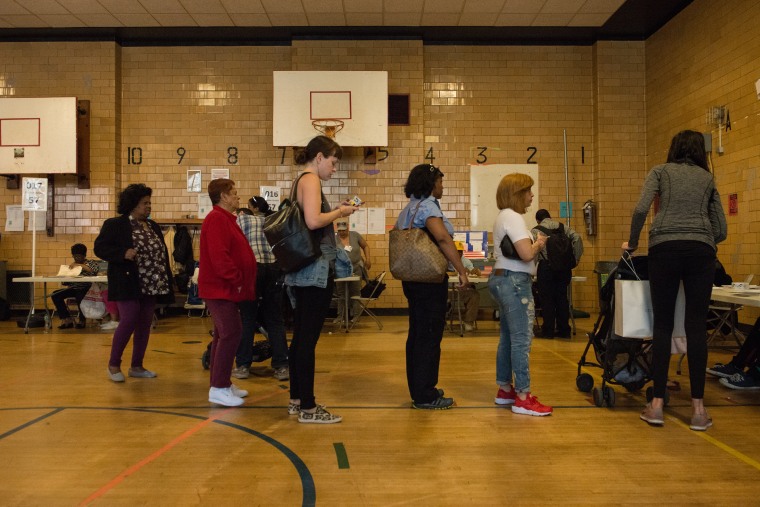As we engage the process of transitioning from President Obama’s to President-Elect Trump’s administration, there continues to be significant discussion about what the transition means for educational access, especially for individuals and communities that have historically been neglected or ignored by post-secondary institutions as well as state and local governments.
Many want to know: “How will my concerns about my school district or my opportunities to fund a college certificate, credential or diploma be impacted by the changes in the White House and in Washington, DC?” or “Will the issues that matter most to my community be ignored while the issues thought to impact the nation as a whole take center-stage?"
While there are a lot of unanswered questions about the current political transition one thing that is certain—if you remain silent on those issues that matter to you most you can expect for nothing to happen.
RELATED: Editorial: Education is the Civil Right
While it may sound cliché, there is power in one simple refrain: all politics is local. The first step in ensuring that local concerns are addressed is electing officials who have demonstrated both an understanding of and willingness to advocate for those individuals and issues that matter most to you.
Have you elected leaders who have invested their time, talent and treasure to improve schools; address funding disparities or otherwise ensure equity? Have you done the work required to understand if they like children—and not just those related to them?
It seems simple, but first, it is important to get to know whom you elected into the position, and what their stance is on issues related to primary, secondary, and postsecondary education. Familiarize yourself with what the responsibilities are for their specific elected position, and the hierarchy within your local government. Having this knowledge will help you to ensure that your elected official is attending to the needs of the community.
A key to holding leaders accountable is establishing relationships, before you need to.
After ensuring that those elected to lead are concerned about that which matters most, we must commit ourselves to the tough task of ensuring those individuals are accountable to the people and issues they purported to care about.
What matters most is getting engaged—in ways that amplify the needs of those most often neglected and ignored. Here are a four ways to answer the question: what can I do to become more civically engaged?
- Don’t like the options for elected leaders? Consider running for the position. Run for your office, consider your local school board. Local school boards make the decisions that directly affect the youth in your community. While each district’s school board requirements for election, vary, it is imperative that parents and advocates that have direct interaction with the schools in your respective district fill those positions. Take some time today to find out who the current members of your local school board are, what is required to run for your local school board, and the commitments required of school board members.
- Create accountability circles. As a parent or guardian with many responsibilities, it is not always possible to be present in the room when critical decisions are being made about your child’s education. However, the community can work together to monitor the progress of your elected officials. Create designated circles around an issue of concern, and work together to create task items to address the issue and engage parents, elected officials, and administrators in the process.
- Develop projects and initiatives that allow families from all walks of life to get involved. If an overwhelming number of adults in your community have obligations that prevent them from maintaining an active presence on campus during the day and at PTA meetings, work with the administration and local community organizations to develop programs that they can lead and get involved in. Be sure to consider projects that adults can contribute to regardless of resources and/or availability, such as youth summer employment programs with local businesses to provide youth with the opportunity to gain real-world experience that they can apply both inside and outside of the classroom or food pantry drives for students and families in need. In addition, help educate parents and caring adults about ways that they can make an impact even when they are not physically present in the school environment.
- Whatever you do, get the youth involved. Youth are often conditioned to believe that they should not have a say so in their educational trajectory. This is problematic. Help youth to understand the role that educators, politicians and other leaders have in their educational experience through informational forums, host professionals to discuss their post-secondary pursuits, conduct a letter-writing workshops to help youth write letters to representatives regarding their concerns as a students, so that they understand the significance of their voice and its effect on their educational experience.

Too many of us missed the civics lesson explaining what happens after one is elected and then sworn into office. Hollywood has lulled too many of us into thinking that once our elected officials show up in city council, state capitals and even the White House, the work is done, when in fact, those symbolic moments signal just the beginning of the tough work.
Holding leaders accountable requires at least two critical components: the first, educating oneself on the issues and opportunities for leaders to impact meaningful change and the second, ensuring leaders are aware of what you, and other constituents want and need so they can be held accountable for the decisions they make.
A key to holding leaders accountable is establishing relationships, before you need to. When I worked on Capitol Hill, as a senior policy advisory to the Health, Education, Labor and Pensions (HELP) Committee in the United States Senate, I frequently reminded colleagues and constituents that members (elected officials) were impacted often by three things: personal experience, what matters most to constituents and what’s sexy (or what is often discussed in local and national news).
RELATED: Without Local School Boards, Parents in Poor Communities Lose Vote
Whenever possible we should identify personal connections that leaders have to individuals or issues with policy implications. Consider for example, Senator Tom Harkin, a democratic representative from Iowa, a champion for the needs of individuals with disabilities—in part because of his brother’s experience with hearing loss. Senator Harkin has introduced legislation to support individuals with hearing loss and has gone on record talking about the pain he felt as he witnessed, first hand, the struggled that Frank, his brother, faced after losing his hearing when they were children.
When personal connections are seemingly more difficult to make we can focus efforts on ensuring that leaders are aware of the things that matter most to those who they represent. A history of labor organizing supports the principle of understanding there is safety and opportunity in numbers. By aggregating the shared desires of a group of people (a community, voting constituency, or association for example) we can communicate that our needs are shared and conversely that there are a number of individuals willing to be supportive of sustaining a positive relationship with the leader or supportive of replacing him or her with someone better suited to address the shared needs of constituents.
Help youth to understand the role that educators, politicians and other leaders have in their educational experience
Educate yourself on the issues impacting you and yours. When considering opportunities to ensure that all children, especially those most neglected and ignored, have access to high-quality learning and development opportunities, one of the best ways to educate yourself on the issues that matter most is to engage in direct dialogue with the experts—ask students what they need to be safe, engaged and supported in school.
Once you’ve engaged in meaningful and authentic dialogue to identify what they need you can do the work of identifying existing resources; listing people and organizations that can be helpful in filling critical gaps; and understanding the policy landscape (opportunities to leverage public policy and government). With an informed sense of both challenges and opportunities you can become an effective advocate who both informs and assists leaders in responding to the needs of constituents.

Finally, we must remain committed to informing local and national conversations about the things that matter most. Use traditional forms of media (news papers, radio and television) in addition to new media (social media including twitter and YouTube) to communicate ideas, frame policy opportunities and ensure leaders are accountable for what they say and do.
Create an echo chamber—lists or groups of people you engage with so that when you share an idea or article or video it can be amplified and shared by others.

